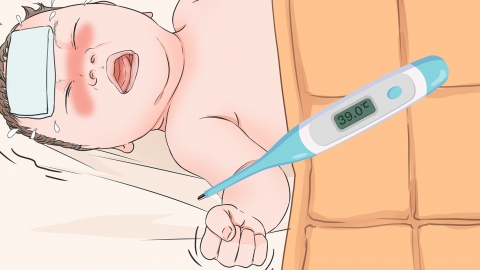What should be done when a 2-year-old child has a fever of 39°C with warm hands and cold feet?
Generally speaking, fever refers to an elevated body temperature. A 2-year-old child with a fever of 39°C having warm hands and cold feet may be caused by imbalances in temperature regulation, excessive fluid loss, upper respiratory tract infection, roseola infantum, pneumonia, or other reasons. Treatment can include general care and medication under a doctor's guidance. Detailed analysis is as follows:

1. Imbalanced Temperature Regulation
The thermoregulatory center in infants is not yet fully developed. During high fever, heat distribution in the body becomes uneven, often manifesting as warm hands and cold feet, which is a natural response during body temperature regulation. It is important to maintain a suitable indoor temperature to prevent the child from becoming too cold or too hot. Dress the child appropriately to avoid overheating or chilling.
2. Excessive Fluid Loss
During high fever, water evaporates more quickly from the child's body. If fluids are not replenished promptly, circulation may slow down, affecting peripheral body temperature. Ensure the child drinks sufficient water, especially during fever, and frequently offer fluids to prevent dehydration.
3. Upper Respiratory Tract Infection
An upper respiratory tract infection may be caused by either viral or bacterial infection. The inflammation raises body temperature, and due to redistribution of blood circulation, peripheral circulation decreases, causing warm hands and cold feet. Symptoms may also include sore throat and cough. Under a doctor's guidance, medications such as Pediatric Paracetamol, Chlorpheniramine, and Artificial Cow-herb Mixture, Ribavirin Granules, or Amoxicillin and Clavulanate Potassium Dry Suspension can be used for treatment.
4. Roseola Infantum
Roseola infantum is caused by human herpesvirus 6. Following high fever, a rash appears, during which thermoregulation may become imbalanced, leading to warm hands and cold feet. Symptoms may also include runny nose and reduced appetite. Under a doctor's guidance, medications such as Acyclovir Granules, Pediatric Chaiqin Qingre Granules, or Ibuprofen Suspension Drops may be used for treatment.
5. Pneumonia
Pneumonia is often caused by bacterial, viral, or mycoplasma infection. Lung inflammation may cause high fever, and due to the impact of inflammation on blood circulation, peripheral body temperature may decrease. Symptoms may also include cough with sputum and difficulty breathing. As per medical advice, medications such as Cefixime Granules, Dextromethorphan Hydrobromide Syrup, or Azithromycin Dry Suspension may be used for treatment.
Regularly monitor body temperature to detect changes promptly and take appropriate measures. At the same time, ensure balanced nutrition to enhance the child's immunity and reduce the likelihood of illness.





